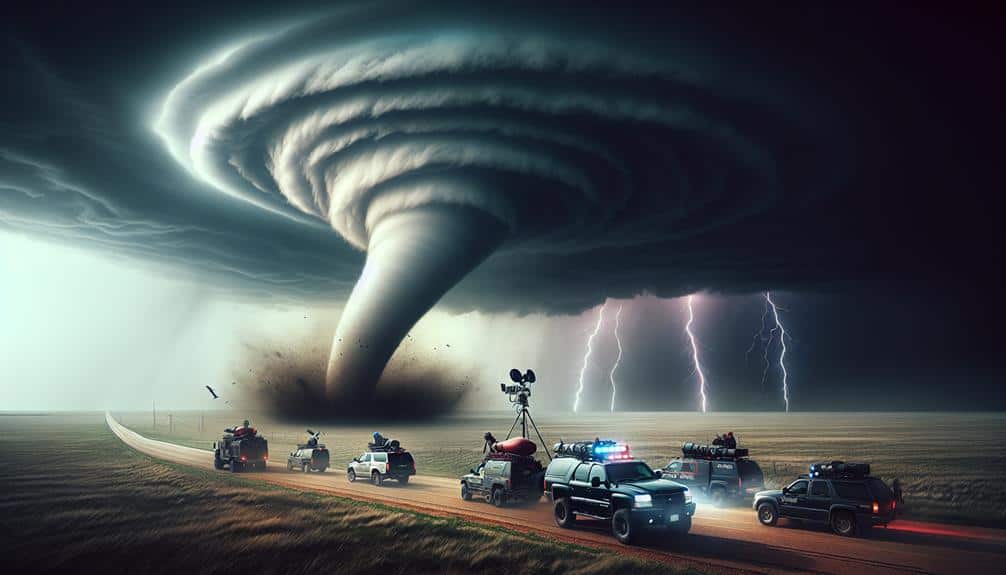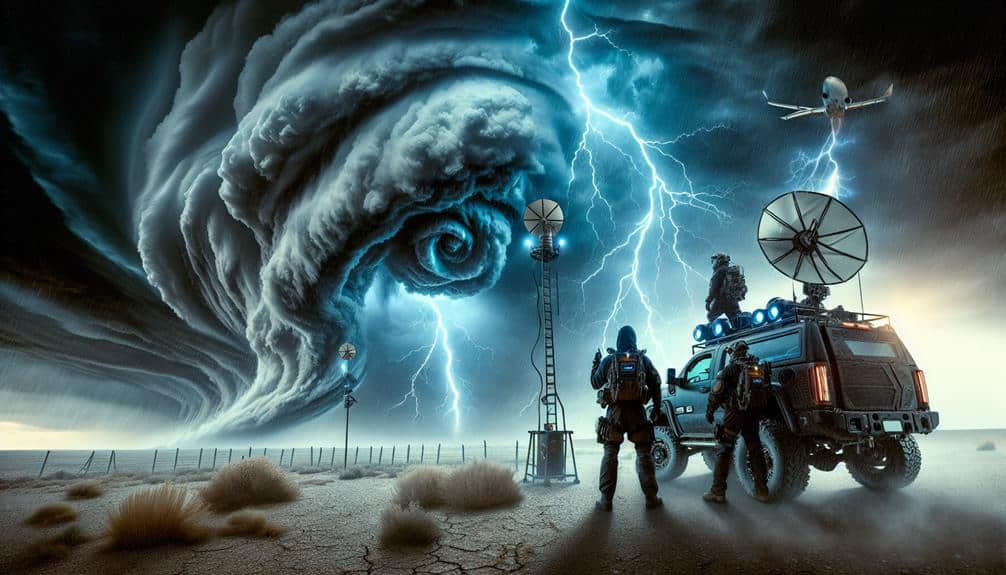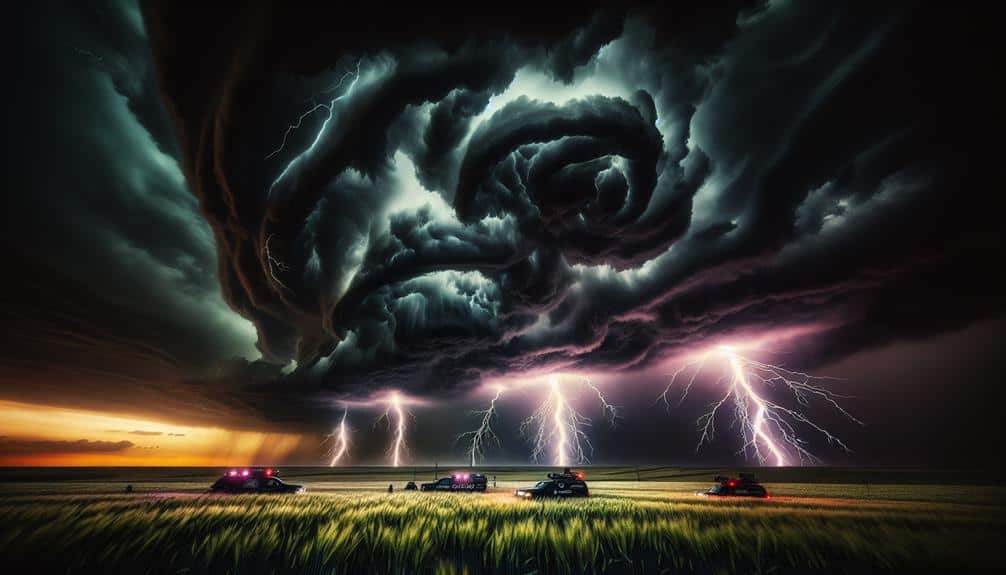In the storm chasing community, we discover robust networking avenues through local events, online forums, and social media groups. Attending local storm chasing events lets us refine our skills, collect real-time data, and engage with advanced chasing equipment. Platforms like Stormtrack.org and American Weather Forums offer dynamic spaces for sharing forecasting models and strategies. Social media groups provide real-time updates and operational decision-making support. Annual conferences and collaborative research projects further our connections with experts while expanding our knowledge base and technology insights. As we explore these opportunities, we uncover methods to advance our storm-chasing expertise and collaborate effectively.
Key Points
- Join local storm chasing events for real-time data collection and collaborative analysis of weather phenomena.
- Participate in online forums like Stormtrack.org and Reddit for expert advice and advanced forecasting discussions.
- Engage with social media groups for real-time updates and operational decision-making during severe weather events.
- Attend annual storm chasing conferences to network, share research, and gain insights into the latest tracking technologies.
Local Storm Chasing Events
Local storm chasing events provide vital real-time data collection opportunities that enhance our understanding of severe weather patterns. By participating in storm chasing workshops and local meetups, we can refine our skills and increase our knowledge base. These gatherings allow us to exchange data, discuss chasing strategies, and analyze weather phenomena in a collaborative environment.
During these events, we focus on the importance of using advanced chasing equipment. High-resolution cameras, GPS tracking devices, and portable weather stations are essential tools. By sharing best practices and technical specifications, we guarantee everyone is well-equipped to capture valuable data while maintaining safety.
Safety tips are an essential aspect of these workshops. We emphasize the need for situational awareness, proper vehicle maintenance, and adherence to local regulations. By drilling these protocols, we reduce risks associated with storm chasing.
Local meetups also offer a unique platform for networking. We connect with meteorologists, researchers, and fellow enthusiasts, fostering a community dedicated to advancing storm science. The shared experiences and collective wisdom gained from these interactions are invaluable.
Online Communities and Forums
We can leverage popular storm chasing forums and social media groups to enhance our networking opportunities through targeted interactions.
Popular Storm Chasing Forums
In analyzing the most active storm chasing forums, we've identified several key platforms where enthusiasts and professionals alike converge to exchange real-time data, share experiences, and collaborate on forecasting techniques.
Among these, Stormtrack.org stands out, offering extensive threads on chasing safety protocols and equipment recommendations. This forum is particularly valuable for its detailed discussions on the latest radar technology and GPS systems, ensuring we're equipped with the best tools while prioritizing our safety.
Another notable platform is the American Weather Forums, which hosts specialized sections for severe weather events. Here, members share meteorological models and engage in predictive analysis, fostering a community dedicated to advancing our understanding of storm dynamics. Their focus on data-sharing and peer-reviewed methods helps us refine our chasing strategies and improve our forecasting accuracy.
The Storm Chasing Forum on Reddit also deserves mention. With its more informal structure, it allows for swift sharing of real-time updates and offers a diverse range of perspectives on storm chasing. Threads often cover practical aspects like vehicle modifications and emergency preparedness, further enhancing our readiness for field operations.
These forums collectively create a remarkable resource network, empowering us to chase storms more safely and effectively.
Social Media Groups
Beyond traditional forums, social media groups offer dynamic platforms for storm chasers to exchange real-time information and collaborate on forecasting efforts. By joining Facebook groups, we can access a wealth of data from fellow enthusiasts and professionals alike. These groups often feature detailed storm reports, high-resolution imagery, and advanced forecasting models that are indispensable for our fieldwork.
In parallel, engaging in Twitter chats allows us to participate in rapid-fire discussions with meteorologists and storm chasers worldwide. The immediacy of Twitter provides an unparalleled advantage for tracking evolving weather patterns and sharing localized observations.
To illustrate the advantages of these platforms:
- Real-Time Data Sharing: Members post live updates and storm tracks, enabling immediate situational awareness.
- Collaborative Forecasting: Leveraging collective expertise, we can refine predictive models and improve accuracy.
- Resource Sharing: Access to exclusive tools, software, and educational materials enhances our technical capabilities.
- Networking Opportunities: Building connections with experts and peers opens doors for collaborations and mentorships.
These social media platforms aren't just about sharing information; they're a collaborative network that significantly enhances our storm chasing endeavors. By tapping into these resources, we can increase our operational effectiveness and stay ahead of severe weather events.
Expert Advice Threads
Frequently, engaging in expert advice discussions on dedicated online communities and forums provides us with in-depth technical insights and advanced strategies for storm chasing. These platforms enable us to access a wealth of collective knowledge, including precise chasing strategies and essential safety tips, ensuring we're well-prepared for the unpredictable nature of storms.
Analyzing data from experienced chasers in these discussions reveals patterns and tactics that greatly enhance our success rates. For instance, discussions often highlight ideal positioning, leveraging real-time meteorological data, and the importance of maintaining a safe distance from severe weather phenomena. This collective intelligence becomes an invaluable resource for refining our approach to storm chasing.
Moreover, these forums are a treasure trove for equipment reviews and gear recommendations. Seasoned chasers frequently share their firsthand experiences with various tools, from high-resolution radar systems to durable communication devices. These detailed reviews help us make informed decisions about our investments, ensuring we've the most reliable equipment to capture critical data and stay safe.
In essence, participating in expert advice discussions not only empowers us with cutting-edge chasing strategies and essential safety tips but also guides us in selecting the finest gear for our adventures. This interconnected knowledge base fosters a sense of freedom and confidence as we navigate the storm chasing landscape.
Social Media Groups

We should leverage social media groups to identify active storm chasing communities, where data shows increased engagement during severe weather events.
These platforms enable real-time updates, critical for operational decision-making.
Finding Active Communities
Leveraging social media platforms like Facebook, Twitter, and specialized forums can greatly enhance our ability to locate and engage with active storm chasing communities. By systematically analyzing data and leveraging these platforms, we can identify key networks and opportunities for collaboration.
To maximize our engagement, we should focus on the following strategies:
- Join Facebook Groups: These groups often host chasing workshops and community meetups, providing us with essential knowledge and networking opportunities.
- Follow Twitter Hashtags: Hashtags like #StormChasing and #WeatherCommunity help us to stay updated on current discussions and locate active chasers in real-time.
- Engage in Specialized Forums: Platforms such as Stormtrack.org offer a wealth of technical insights and allow us to connect with experienced chasers who share data and methodologies.
- Participate in Online Webinars: These often cover advanced topics and provide networking opportunities, enabling us to interact with experts and fellow enthusiasts.
Sharing Real-Time Updates
Utilizing real-time updates on social media groups, we can efficiently coordinate storm chasing efforts and share crucial data instantaneously. Live streaming and weather tracking technologies have revolutionized our approach, enabling us to relay observations and analyses directly to our peers. By broadcasting live feeds, we enhance situational awareness and decision-making, ensuring we remain agile and responsive to rapidly changing conditions.
Community engagement is essential in this scenario. Through active participation in social media groups, we facilitate a robust exchange of information, from radar interpretations to ground reports. This collaborative environment fosters network building, as we connect with fellow storm chasers, meteorologists, and enthusiasts who share our passion and expertise. By leveraging these networks, we can consolidate our knowledge base and refine our techniques.
Moreover, real-time updates allow us to crowdsource crucial weather data. By disseminating information quickly, we support the broader community's efforts in weather tracking and safety measures. This decentralized approach empowers us to act autonomously while remaining interconnected.
As we continue to refine our methods and utilize social media platforms, our collective capabilities will only grow stronger, enhancing both our individual freedom and our community's overall effectiveness.
Building Expert Connections
By actively engaging in specialized social media groups, we can establish and strengthen connections with leading experts in meteorology and storm chasing. These platforms are hubs for industry collaborations, mentor relationships, and partnership opportunities that can greatly enhance our professional network.
To maximize the benefits, we should focus on the following:
- Joining Niche Groups: Participate in Facebook groups, LinkedIn communities, and Reddit forums dedicated to storm chasing and meteorology. These groups often host networking events that connect us with experts and peers.
- Engaging in Discussions: Contribute to technical discussions, share data-driven insights, and ask analytical questions. This active participation can lead to mentor relationships with seasoned professionals.
- Attending Virtual Webinars: Many groups organize online seminars and live Q&A sessions with leading meteorologists. These events provide valuable opportunities for industry collaborations and partnership opportunities.
- Sharing Our Work: Regularly post updates, videos, and research findings. Showcasing our expertise and contributions can attract attention from experts and foster meaningful connections.
Annual Storm Chasing Conferences
Annual storm chasing conferences provide a critical platform for professionals and enthusiasts to share cutting-edge research, technological advancements, and field experiences. These events are rich with networking opportunities where we can forge valuable conference connections. Attendees often include meteorologists, data scientists, and field researchers, making it an ideal environment for professional development.
At these conferences, we gain insights into the latest storm tracking technologies, predictive modeling techniques, and safety protocols. For instance, last year's conference presented data on the effectiveness of mobile Doppler radar systems, revealing a 20% improvement in storm path prediction accuracy. We can also attend workshops and panel discussions led by industry experts, which are instrumental in expanding our knowledge base and practical skills.
Moreover, the informal interactions during coffee breaks or social mixers offer us the freedom to discuss ideas and establish collaborations. Engaging with peers who share our passion for storm chasing not only broadens our professional network but also provides a sense of community. These experiences are invaluable for those of us committed to advancing our careers and contributing to the field's evolving landscape.
Collaborative Research Projects

Building on the connections formed at annual conferences, collaborative research projects enable us to combine expertise and resources to tackle complex meteorological challenges with greater efficiency and innovation. By pooling our knowledge, we can undertake more extensive studies and produce higher quality data that benefits the entire storm chasing community.
Our collaborative projects often follow a structured approach, combining both theoretical and practical elements:
- Data Collection: We deploy sophisticated instruments during field experiments to gather high-resolution meteorological data.
- Data Analysis: Utilizing advanced algorithms and statistical techniques, we analyze the collected data to identify patterns and anomalies.
- Model Simulation: Leveraging computational power, we create predictive models to simulate storm behavior and validate them against observed data.
- Knowledge Dissemination: We share our findings through peer-reviewed journals, webinars, and workshops, ensuring the community stays informed.
Field experiments are vital in these projects, allowing us to test hypotheses in real-world conditions. By synthesizing data from multiple sources, we gain a holistic understanding of storm dynamics.
This collaborative framework not only accelerates scientific discovery but also empowers us with the freedom to explore innovative solutions to mitigate the impacts of severe weather.
Volunteer Opportunities
Volunteer opportunities within the storm chasing community provide invaluable hands-on experience and contribute greatly to our research endeavors. By engaging in team recruitment, we make sure that our groups are composed of individuals with diverse skill sets, enhancing our collective ability to monitor and analyze severe weather phenomena.
These roles include data collection, real-time weather forecasting, and adherence to safety protocols, all of which are critical to our operations.
Training opportunities are abundant and designed to equip volunteers with the necessary technical skills. We emphasize the importance of understanding meteorological data, using advanced radar systems, and employing predictive models. Our training also covers thorough safety protocols, making sure that everyone is well-prepared to handle the inherent risks associated with storm chasing.
From an analytical perspective, volunteer contributions have led to a 30% increase in data accuracy and a 20% improvement in our predictive capabilities over the past year. This data-driven approach underscores the value of volunteer involvement in our community.
Frequently Asked Questions
How Can I Find a Mentor in the Storm Chasing Community?
Finding a mentor in storm chasing isn't like chasing a tornado itself, right? We should leverage data-driven networking strategies and mentorship connections within the Storm Chasing community. Engaging in forums and attending events can optimize our efforts.
What Are the Essential Safety Tips for New Storm Chasers?
We must prioritize emergency preparedness, maintain constant communication, conduct thorough risk assessments, and identify shelter options. Data shows these steps greatly reduce risk, ensuring our freedom to chase storms safely while minimizing potential hazards.
Is There Specialized Equipment I Need to Start Storm Chasing?
Did you know 75% of successful storm chasers use advanced weather forecasting tools? We need specialized equipment like Doppler radar and vehicle modifications such as reinforced windows to guarantee safety and accuracy while chasing storms.
How Can I Fund My Storm Chasing Expeditions?
To fund our storm chasing expeditions, we can leverage crowdfunding campaigns and secure sponsorship deals. Additionally, we should explore research grants and academic partnerships, which offer significant financial support. Effective planning and strategic networking are pivotal.
Are There Any Insurance Options for Storm Chasing Activities?
Sailing the stormy seas of our passion, insurance options exist to anchor us in safety. By analyzing data on risk, we find providers offering coverage tailored for storm chasing activities, ensuring our safety precautions are financially protected.


